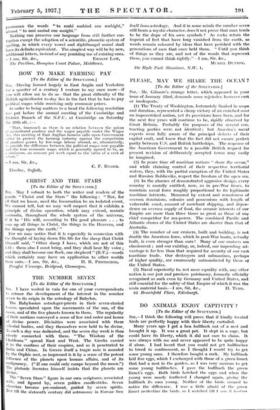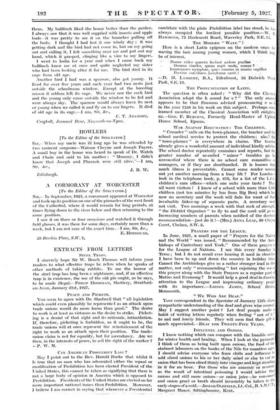DO ANIMALS ENJOY CAPTIVITY?
[To the Editor of the SPECTATOR.]
think the following will prove that if kindly treated birds arc perfectly happy with their liberty curtailed.
Many years ago I got a hen bullfinch out of a nest and brought it Up. It was a great pet. It slept in a cage, but could have its liberty, which it did not care to claim. It was always With me and never appeared to be quite happy if alone. I had heard that you could not get bullfinches to breed in confinement, so I thought I would try to get some young ones. I therefore bought a cock. My bullfinch laid five eggs, which I exchanged with those of a green linnet that had a nest in the garden, as I was very anxious to get some young bullfinches. I gave the bullfinch the green linnet's eggs. Both birds Latched the eggs and when the young were nearly feathered I changed again, giving the bullfinch its own young. Neither of the birds secured to notice the difference. I was a little afraid of the green linnet nefflectine the birds. so I watched till T slIW it. fiqvi them. My bullfinch liked the house better than the garden. I always saw that it was well supplied with insects and apple buds—it was pretty to see it on the branches pulling off the buds. I thought I had lost it one windy day ; it was getting dark and the bird had not come in, but on my going out and calling it, I felt something near me and put out my hand, which it grasped, clinging like a vice to my .fingers. I went to India for a year and when I came back my bullfinch knew me at once aml quite neglected my sister who had been looking after it for me. The bird died in its cage from old age.
Another bird I had was a sparrow, also got young. It lived for over five years and each year had two nests just outside the schoolroom window. Except at the breeding season it seldom left its cage., We never saw the cock .bird and the young only came outside the window to be fed and were always shy. The sparrow would always leave its nest or young when we called it and fly on to our fingers. . It died of old age in its cage.—I am, Sir, &c., C. T. ADAMSON, Crughall, Jesmond Dene, Newcastle-on-Tyne.



























































 Previous page
Previous page